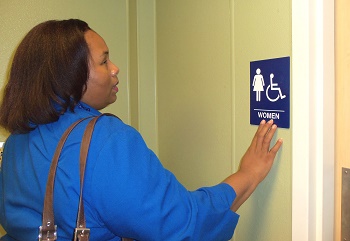My Hands and Blindness
I never realized how important my hands were until I went totally blind. Now don’t get me wrong. Of course, I knew my hands were vital to my life because I used them daily to accomplish many things. For example, dressing, cooking, cleaning, writing, carrying things, even dialing my landline phone and communicating with hand gestures. But, after losing my vision, my hands became my eyes. I used them to explore and discover the world around me. I had to use them to decipher objects and determine their meaning. I would hold an item in my hands and be puzzled. To determine what it was, I would touch and feel the object, investigating its shape, size, texture, and weight. Well, with all that touching and feeling around, my hands were all over the place.
I also made a meager attempt to learn braille. Sliding my hands and gently pressing my fingertips across a page full of bumpy dotted lines was a new experience. It required concentration and a light touch. My braille skills are not top-notch, but I can muscle through to read homemade labels, bathroom signs, calendars, greeting cards and elevator panels.
 Empish Reading Braille on Bathroom Sign
Empish Reading Braille on Bathroom Sign
National Hand Washing Awareness Week
All this started me thinking about how even more important it was to keep my hands clean since they were touching all kinds of stuff–doorknobs, my white cane, stair rails, food, tabletops, car doors, people’s elbows and on and on. I became hyperaware of my hands and the need to keep them spotless. This realization went beyond what my parents taught me as a child about washing my hands before eating. This meant washing a lot more often. In observation of National Handwashing Awareness Week, December 1-7, let’s discuss the importance of hand washing.
Importance of Hand Washing
Why is washing your hands so important? Besides the obvious of removing visible dirt and grime, there are germs and bacteria. Personal hygiene can start and finish with our hands because of easily transmitting germs and bacteria. Clean hands help prevent illness. So, it’s especially important for those with vision loss to be mindful of hand hygiene basics since we use our hands more frequently.
It is even more important with stopping the spread of COVID-19. Next to wearing a mask and watching your distance, washing your hands is critical in protecting and keeping yourself safe and well from this virus.
Seven Steps to Proper Hand Washing
Do you know how to properly wash your hands? It is more than just quickly rubbing some soap on, rinsing, and drying. Or only running your hands underwater. Here are seven steps provided by the Centers for Disease Control (CDC) and World Health Organization (WHO):
1. Wet your hands with clean — preferably running — water.
2. Apply enough soap to cover all surfaces of your hands and wrists.
3. Lather and rub your hands together briskly and thoroughly. Make sure to scrub all surfaces of your hands, fingertips, fingernails, and wrists.
4. Scrub your hands and wrists for at least 20 seconds.
5. Rinse your hands and wrists under clean — preferably running — water.
6. Dry your hands and wrists with a clean towel or let them air-dry.
7. Use a towel to turn off the faucet.
Soap versus Hand Sanitizer
Soap combined with running water is the best way to remove germs from our hands. The lathering of hands and scrubbing thoroughly creates friction helping lift and wash away dirt, grease, and microbes under running water. Also, soap takes some time to work; at least 20 seconds to disinfect your hands thoroughly.
Hands down, soap and water is preferable for sanitizing your hands, but if not available hand sanitizer is also effective. Use an alcohol-based hand sanitizer. Make sure it contains at least 60% alcohol. Apply the gel to your palm. Rub your hands together covering the surfaces of your hands and fingers until your hands are dry.
Make it a Family Affair
If you have children make hand washing a family affair. Get the kids in on the action by washing hands together. Let your small children see how it is done by you leading the way. Give them simple, short, and easy steps to follow. Make it fun with kid-friendly soap pumps and bathroom towels. Be musical singing the “Happy Birthday” song, “Twinkle Twinkle Little Star” or make up your own just be sure it lasts at least 20 seconds.
Hand Washing and Animals
After touching, feeding, and playing with your furry friend don’t forget to wash your hands. Zoonotic diseases can be transferred from humans to animals very easily. Wash hands after handling pet food, water bowls, pet toys and living spaces for your animal. Keep these surfaces clean and wash hands often.
Let’s Shake on It
Can we shake on it? I think we can all agree hand washing is important to staying healthy and well, including eye health. I am not trying to gross you out but think about all the things we touch in a day, even in an hour. That’s a lot of stuff! But even more so for people with a visual impairment. Since our hands sometimes work as our eyes, it is critical we keep them clean.